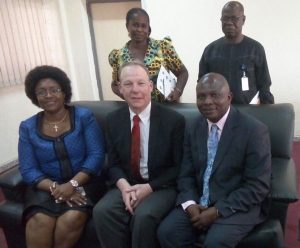At the Lagos University Teaching Hospital, a high level course on fungal diseases started today. With over 17 million Nigerians affected by serious fungal infections, and tens of thousands of deaths, better diagnostics are the cornerstone of improved care. The course focuses on modern diagnostics that need to be incorporated into routine care in Nigeria.
Over 11.8% of the Nigerian population is estimated to suffer from a serious fungal infection each year. As the most populous country in Africa with a high rate of tuberculosis and a moderate HIV infection burden, too many patients die of fungal infection that is not diagnosed or treated. Major improvements in diagnostic technologies in the last 15 years have not made it to Nigeria, with the one exception of cryptococcal meningitis testing in AIDS.
Senior physicians and participants were drawn from across the country including Benin City, Calabar, Ibadan, Abuja, Osogbo, Ekiti, Port Harcount, Enugu, Ilorin and Kano. The course was run by Dr Rita Oladele and Dr Nicholas Irurhe from the Medical College of University of Lagos. Professors David Denning and Malcolm Richardson from the University of Manchester and the Global Action Fund for Fungal Infections lectured and ran practical sessions.

Dr Rita Oladele commented: “We are now seriously engaged in plugging the huge gap in fungal diagnostics in Nigeria. My colleagues in microbiology and on the wards are focused on bringing Nigeria’s capacity to diagnose rapidly progressive and potentially lethal fungal infections to international standards.”
Top fungal problems in Nigeria include cryptococcal meningitis in AIDS (~60,000 cases), Pneumocystis pneumonia (PCP) (~75,000 cases), chronic pulmonary aspergillosis after TB (CPA) (140,000 cases), recurrent yeast infections (vulvovaginal candidiasis) in women (1.8 million), fungal hair infections in children (tinea capitis) (15 million) and fungal asthma (215,000). Not enough data are available to estimate fungal diseases in cancer and critically ill patients, but they are frequent.
Dr Evelyn Ngige, Director of Public Health in the Ministry of Health who met with Professor Denning yesterday declared: “Fungal infections are a challenge for all health care systems, and need more attention. Improved fungal disease diagnosis fits the government’s strategy to strengthen laboratory capability across the country. I welcome the training course at LUTH, which will contribute to improved care and assist our AMR control strategy.”